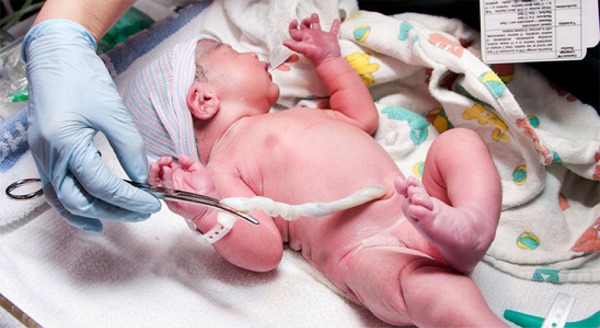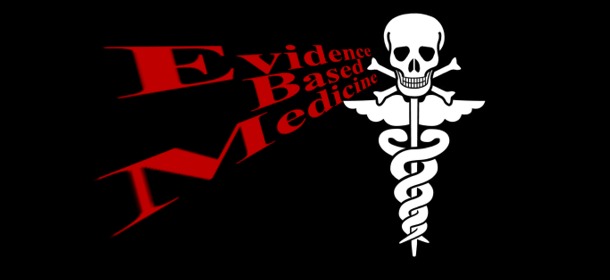Conventional Med
Routine Early Cord Clamping Harms Newborns: No Evidence of Benefit Ever Existed
The harm of early umbilical cord clamping is finally reaching the mainstream media. It’s done routinely, presumed to be beneficial, but without one shred of evidence. Here’s Gaia Health’s coverage of newborn cord clamping from over a year ago:
In hospitals, one of the first procedures done when a new child enters the world is to clamp the umbilical cord, usually within the first 30-60 seconds of birth. It is, in fact, simply a routine procedure done without thinking. Apparently, no thought has ever been given to whether it’s beneficial. Sadly, several studies have shown that it harms newborns.
Cord Clamping One of the Earliest Birth Interventions
In fact, early clamping of the umbilical cord was one of the earliest interventions in modern management of childbirth. It was—and is—done for no particular reason, other than convenience. In the early 1980s, studies showed that the combination of routine hospital childbirth practices, including oxytocin to cause contraction of the uterus when necessary, presumed that, since it was routine, early cord clamping must be beneficial. Now, though, a meta-study has documented that the assumption has harmed countless babies.
Childbirth is a dramatic transfer in function. The mother’s body relinquishes control of the baby’s functions. During the birthing process, the placenta gradually stops pushing blood from the mother to the baby. When everything goes right—as it usually does—a point of equilibrium arises when blood stops flowing from the mother to the baby.
Until that point, the baby needs to receive blood and oxygen from the mother. Premature clamping of the umbilical cord stops the newborn from receiving critical oxygen when he may not be ready to function on his own. Modern medicine’s unconsidered early clamping procedure routinely cuts off oxygen from newborns.
Dangers of Cord Clamping Have Been Ignored
The most telling point of this issue is that, though there have been several studies documenting harm from early umbilical cord clamping, it took a meta-analysis of several studies for any attention to be paid to clear evidence showing harm.
Studies have documented that early clamping results in anemia of newborns. The difference between early clamping and natural cessation of cord blood flow has been established to result in the loss of 21% of the blood that would normally have transferred between mother and child.
Clamping Is Generally Not Needed
In home births, the only reason for clamping an umbilical cord early is necessity. When a cord is wrapped around the neck and impeding birth, it’s necessary. Otherwise, the cord is ignored until it’s clear that birth has been safely established.
In a normal, non-intervention childbirth, the child breathes first, and the cord then stops transferring blood and oxygen. That, though, is ignored when cords are automatically clamped without consideration of the baby’s needs.
The simple fact that no clamping is needed in a normal birth—or even in most abnormal births—is utterly ignored by modern medicine.
Attempts to Justify Early Clamping
To justify early cord clamping, modern medicine postulated that polycythemia (excess red blood cells) or hyperbilirubinaemia (high levels of red blood cells and and bile) might be caused by delaying clamping. In reality, though, studies attempting to show such results have failed.
But modern medicine is in a hurry. After all, time is money. Waiting for nature to take its course is costly. Let’s move on, get on with it. There’s money to be made in them thar newborns!
Studies that attempted to justify early cord clamping were never able to accomplish their goals. Yet, early clamping continued.
Babies at Greatest Risk
In today’s world, modern medicine has presumed it has the right to intervene for nothing more than its own convenience. As a result, caesarian births have become commonplace. Babies born this way are the ones most harmed by early cord clamping. These babies have not been through the normal rigors of childbirth. Their systems have not received the normal triggers to activate life functions. Yet, modern medicine doesn’t distinguish between these abnormally-born children and normal births. (Not that any differentiation between normal and hospital births has received any consideration, either.)
As the meta-analysis has documented, caesarian-born and prematurely-born babies are the most harmed by early umbilical clamping. What is most disconcerting is that, before the recent meta-analysis, several studies had already documented that preterm and caesarian babies suffer from greater anemia and bleeding in the brain from early clamping. But that has been almost completely ignored in obstetrics.
Mothers’ Needs
Early clamping has never been shown to benefit mothers.
Beneficiaries of Early Cord Clamping
Modern medicine stakes itself on the territory of “evidence-based medicine”. The reality, though, is far removed from the verbiage. The fact is that convenience and profits have determined much of routine practice. Routine and early umbilical cord clamping is a clear example of the reality.
Without any reason, modern medicine has routinely clamped umbilical cords as quickly as possible, apparently to get the procedure out of the way. It has been done without a second thought for the welfare of either the mother or the baby.
Studies documenting harm and lack of benefit have simply been ignored. The attitude has obviously been, “If no one knows, then it doesn’t matter.” In the meantime, countless babies have been damaged by the routine intervention of a procedure that has never been shown to be beneficial. Studies demonstrating its risks have been completely ignored, and presumptions—based on nothing but wishful thinking—have been used to justify interventions over the natural process.
How many babies have died or suffered disabilities, sacrificed on the altar of modern medicine’s ego and hubris?
Sources:
- Umbilical cord clamping after birth
- Wait to cut umbilical cord, say researchers
- Babies are ‘helped by delay in clamping umbilical cord’ Read more: http://www.dailymail.co.uk/health/article-1281688/Babies-helped-delay-clamping-umbilical-cord.html#ixzz0xwSpv5dK
- Umbilical Cord Clamping Should Be Delayed, Says Expert
Tagged conventional medicine, cord clamping, cord clamping harm, delay cord clamping, early cord clamping, evidence-based medicine, umbilical cord clamping

















Pingback: Routine Early Cord Clamping Harms Newborns: No Evidence of Benefit Ever Existed | Next Level Nutrition
Pingback: » The Other Baby Book~An Interview with the Author Little Hearts/Gentle Parenting Resources
Pingback: Over One-Fourth of Patients Die With Undiagnosed Disorders | Gaia Health